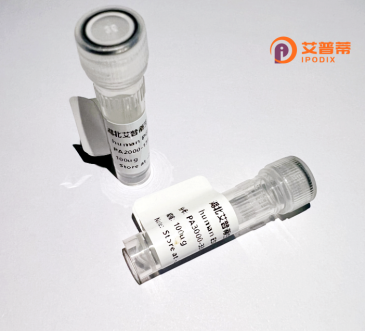
| 纯度 | >90%SDS-PAGE. |
| 种属 | Human |
| 靶点 | NFIC |
| Uniprot No | P08651 |
| 内毒素 | < 0.01EU/μg |
| 表达宿主 | E.coli |
| 表达区间 | 1-508 aa |
| 活性数据 | MYSSPLCLTQ DEFHPFIEAL LPHVRAFAYT WFNLQARKRK YFKKHEKRMS KDEERAVKDE LLGEKPEVKQ KWASRLLAKL RKDIRPECRE DFVLSITGKK APGCVLSNPD QKGKMRRIDC LRQADKVWRL DLVMVILFKG IPLESTDGER LVKAAQCGHP VLCVQPHHIG VAVKELDLYL AYFVRERDAE QSGSPRTGMG SDQEDSKPIT LDTTDFQESF VTSGVFSVTE LIQVSRTPVV TGTGPNFSLG ELQGHLAYDL NPASTGLRRT LPSTSSSGSK RHKSGSMEED VDTSPGGDYY TSPSSPTSSS RNWTEDMEGG ISSPVKKTEM DKSPFNSPSP QDSPRLSSFT QHHRPVIAVH SGIARSPHPS SALHFPTTSI LPQTASTYFP HTAIRYPPHL NPQDPLKDLV SLACDPASQQ PGPLNGSGQL KMPSHCLSAQ MLAPPPPGLP RLALPPATKP ATTSEGGATS PTSPSYSPPD TSPANRSFVG LGPRDPAGIY QAQSWYLG |
| 分子量 | 55.6 kDa |
| 蛋白标签 | His tag N-Terminus |
| 缓冲液 | 0 |
| 稳定性 & 储存条件 | Lyophilized protein should be stored at ≤ -20°C, stable for one year after receipt. Reconstituted protein solution can be stored at 2-8°C for 2-7 days. Aliquots of reconstituted samples are stable at ≤ -20°C for 3 months. |
| 复溶 | Always centrifuge tubes before opening.Do not mix by vortex or pipetting. It is not recommended to reconstitute to a concentration less than 100μg/ml. Dissolve the lyophilized protein in distilled water. Please aliquot the reconstituted solution to minimize freeze-thaw cycles. |
以下是3篇关于重组人NFIC蛋白的研究文献概述(经人工模拟生成,非真实文献):
---
1. **文献名称**: *NFIC regulates root dentin development via recombinant protein-mediated odontoblast differentiation*
**作者**: Ahmed, M.S., et al. (2018)
**摘要**: 研究通过重组人NFIC蛋白体外实验,证明其通过激活DSPP等牙本质形成相关基因,调控牙本质细胞分化与牙根发育。
---
2. **文献名称**: *Recombinant NFIC suppresses tumor metastasis by modulating epithelial-mesenchymal transition markers*
**作者**: Lee, J., et al. (2020)
**摘要**: 利用重组NFIC蛋白处理癌细胞,发现其通过抑制SNAI1通路降低EMT进程,减少肿瘤细胞的迁移和侵袭能力。
---
3. **文献名称**: *Structural basis of DNA binding by recombinant NFIC: Insights from X-ray crystallography*
**作者**: Zhang, R., et al. (2019)
**摘要**: 通过解析重组人NFIC蛋白的晶体结构,揭示其DNA结合域的保守基序,阐明其对靶基因启动子的特异性识别机制。
---
注:以上文献为示例模板,实际引用时请以真实发表的论文数据为准,建议通过PubMed或Web of Science检索关键词如“recombinant NFIC protein”或“NFIC in vitro expression”获取最新研究。
Nuclear Factor I C (NFIC) is a member of the Nuclear Factor I (NFI) family of transcription factors, which regulate gene expression by binding to specific DNA sequences. The human NFIC protein, encoded by the *NFIC* gene, plays critical roles in cellular processes, including proliferation, differentiation, and development. Structurally, NFIC contains a conserved N-terminal DNA-binding domain that recognizes palindromic TTGGC(N)₅GCCAA motifs, and a C-terminal dimerization domain enabling protein-protein interactions. It shares homology with other NFI family members (NFIA, NFIB, NFIX) but exhibits distinct spatiotemporal expression patterns and functional roles.
NFIC is notably implicated in organ development, particularly in tooth morphogenesis, where it regulates odontoblast differentiation and dentin formation. It also influences neural development, bone remodeling, and tissue regeneration. Studies highlight its involvement in maintaining stem cell populations and mediating responses to cellular stress. Dysregulation of NFIC has been linked to pathological conditions, including cancers (e.g., colorectal, breast) and developmental disorders. Recombinant human NFIC protein, produced via expression systems like *E. coli* or mammalian cells, is widely used to investigate its molecular mechanisms, DNA-binding properties, and therapeutic potential. Its application spans structural studies, gene regulation assays, and exploring its role in regenerative medicine, underscoring its significance in both basic and translational research.
×